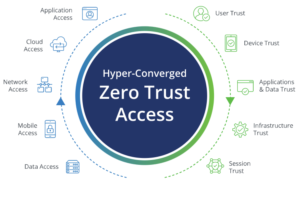Table of Contents
Introduction
Small enterprises grapple with an array of challenges, from budget constraints to operational efficiency. Among the myriad of expenses demanding attention, the allocation of resources towards managed service providers (MSPs) or managed IT services can often be perceived as an optional luxury. However, recent statistics underscore the critical importance of such investments. This article delves into the rationale behind small businesses’ embrace of managed IT services and elucidates how these expenses yield immediate returns on investment (ROI), countering the notion of IT as an expendable cost.
Recent Statistics
Small businesses operate within tight financial margins, with monthly expenses ranging from overheads to employee wages. In this fiscal balancing act, IT services may appear as non-essential expenditure, easily overlooked amidst competing priorities. However, contemporary business operations are increasingly intertwined with digital infrastructure. Recent statistics reveal a stark reality: according to a survey by the National Cyber Security Alliance, 60% of small businesses that experience a data breach are forced to close within six months (read more on this article at InfoSecurity-Magazine). Many of these breaches could have been avoided with simple countermeasures such as:
- increased password complexity
- implementation of multi-factor authentication (MFA)
- security awareness, including phishing training for employees
- basic anti-virus/anti-malware protection on devices
These basic but essential steps serve as effective deterrents against cyber threats, underscoring the critical need for proactive managed IT support from organizations like EkoCyber. Recent studies from Ponemon Institute further estimate the average cost of a data breach for small businesses at $120,000 per incident. Thus, investing in managed IT services emerges not as a luxury, but as a strategic imperative for safeguarding the longevity and viability of small enterprises.
Misconceptions on Managed IT
The misconception that small businesses can manage their IT needs internally persists, fueled by the belief that outsourcing IT services is an unnecessary expense. However, the complexity of modern IT systems renders this approach untenable. Beyond the financial ramifications, downtime resulting from system failures can impede productivity and erode customer trust. Managed service providers offer proactive monitoring, rapid response to issues, and cybersecurity measures, mitigating the risk of data breaches and operational disruptions.
Contrary to popular belief, partnering with an MSP can result in significant cost savings for small businesses. While there is an upfront expenditure associated with hiring an MSP, this investment pales in comparison to the expenses incurred from potential data breaches, system downtime, and productivity losses due to IT-related issues.
MSPs offer scalable pricing models tailored to the specific needs and budget constraints of small enterprises, ensuring that businesses pay only for the services they require. Moreover, by utilizing managed IT, businesses can avoid the overhead costs of hiring and training in-house IT staff, as well as the expenses associated with maintaining and upgrading IT infrastructure.
For an in-depth breakdown of costs associated with hiring an MSP/MSSPs vs. the cost of performing security and IT operations internally, check out our article titled, “Comprehensive Guide To Managed Security Service Providers (MSSP) for Small Businesses in 2024“.
Regulations and Compliance
Moreover, the evolving regulatory landscape underscores the importance of robust IT infrastructure. Compliance requirements, such as the General Data Protection Regulation (GDPR) and the Health Insurance Portability and Accountability Act (HIPAA), impose stringent obligations on businesses to safeguard sensitive data.
Failure to comply can lead to hefty fines and reputational damage. Recent research from Gartner predicts that by 2023, 65% of the world’s population will have its personal information covered under modern privacy regulations, necessitating comprehensive data protection measures.
Managed service providers offer expertise in navigating regulatory complexities, ensuring small businesses remain compliant while focusing on core operations. The investment in managed IT services not only mitigates financial liabilities but also fosters regulatory adherence, enhancing the overall resilience and credibility of small enterprises.
Conclusion
In conclusion, the decision to invest in managed IT services transcends mere financial considerations, embodying a strategic imperative for small businesses. Recent statistics underscore the tangible risks posed by data breaches, system downtime, and regulatory non-compliance, highlighting the critical need for robust IT support.
By partnering with managed service providers, small enterprises can mitigate these risks, fortify operational resilience, and unlock immediate returns on investment. In an era defined by digital disruption and regulatory scrutiny, embracing managed IT services emerges not as a luxury, but as a foundational pillar for sustained success and growth in the competitive lan





